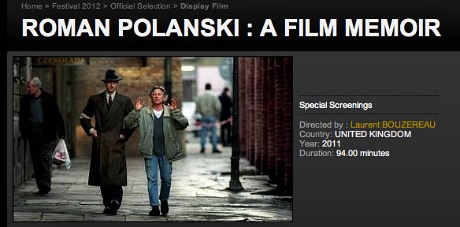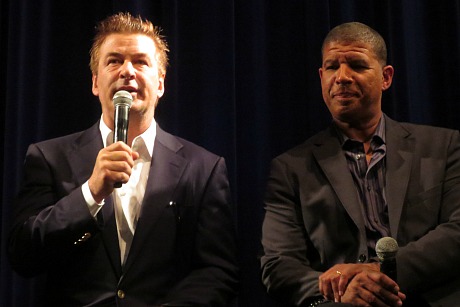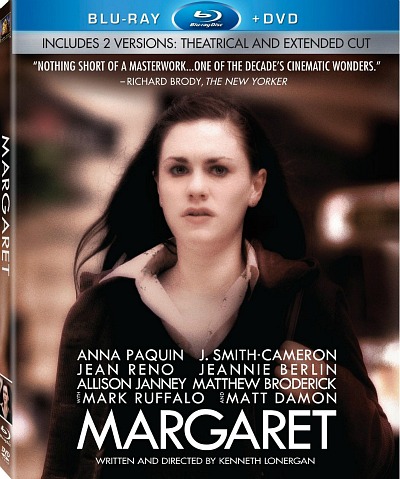The first Twitter reactions following this morning’s 8:30 am screening of Jacques Audiard‘s Rust and Bone were a bit excitable, but calmer voices soon prevailed and now, eight hours after the screening broke, the consensus is set in cement: it’s a fairly good to good to very good film, but Marion Cotillard has the Palme d’Or heat.
More Mud Stuff
Jeff Nichols‘ Mud, which will have its second market screening tomorrow (and to which press persons are excluded), “draws you in almost immediately with the atmospheric landscapes,” says a guy who saw it yesterday afternoon at the Oympia. “It begins with Ellis (Tye Sheridan) and Neckbone (Jacob Lofland), both 14, heading out on the river to an island where a flood has lodged a boat in a tree. They decide to take it until Mud (Matthew McConaughey), a drifter on the run from the law, shows up and claims it as his own.”
And then he proceeds to recount the whole plot so let’s stop here. But “it’s very much a character-rich drama,” he says. “A coming-of-age story for Ellis and redemption story for McConaughey’s. Nichols’ draws you in with the character development. I was immersed in the performances, particularly McConaguhey’s.” The guy didn’t mention Reese Witherspoon‘s work, but his synopsis suggests that her character, Juniper, is flawed and somewhat trashy, which is a welcome change of pace for Ms. Goody Two-Shoes.
God Forgives
I got up early, did a little work and made the 8:30 am screening of Jacques Audiard‘s Rust and Bone, a rooted, intriguing and obviously well made film..but no “masterpiece,” which is what one American visitor has called it. It’s about detachment, emotional and otherwise. And breaking through and growth and all the usual struggling-with-the-bad-stuff stuff. It’s fine and steady and laudable, but let’s not get carried away.
Critics come loaded to these screenings, looking for a good wave like surfers. Hungry to be carried aloft and feel that ecstasy. And when a film is somewhere between good and quite good (i.e., Rust and Bone), some go “oh my God, I’ve just caught some kind of Hawaiian wave of a lifetime!” Calm down. Get some perspective.
The best thing about “the Audiard” is Marion Cotillard‘s performance (a probable Palme d’Or Best Actress contender) as a woman who’s lost her legs. But the truly handicapped figure is Matthias Schoenfaert‘s Ali, a mild-mannered brute who puts a comme ci comme ca face on his “I’m okay, whatever, leave me alone, don’t touch” selfishness.
Yes, the brawny, Schwarzenegger-like Schoenfaert is playing another ox (a cousin of his deballed Bullhead character), and words fail to describe what a boring drag he can be to hang with at times. So there’s that to contend with. But Audiard is such a skilled and honest filmmaker that most of it comes out right, more or less.
I tweeted this about 90 minutes ago: “The story just meanders along, intriguingly and with metaphorical layers and whatnot, but the voltage meter is set to ‘medium’ throughout.” And then Mike D’Angelo tweeted that it’s “the story of a horribly disabled person, and also of a woman with no legs. Stealthy reverse schematism!” To which I replied, “Yes, Schoenaerts’ character is more disabled than Cotillard’s. Obviously. He’s the one who needs to come together. And…?”
Cotillard is so utterly readable in every scene, every moment…but without any apparent effort. Naturalistic acting at its very finest. There’s so much in her eyes and her mouth. I could just stare at her, endlessly.
There’s other sutff to type but I have a 2 pm screening of Sister to try and crash at a market screening. Later…
Thanks For The Lockout
A buyer acquaintance wrote the following this morning: “Too bad you couldn’t get in to Mud yesterday. I saw it at the Olympia and it’s very much a sturdy drama with some redemptive action towards the end, and with very good performances by all” — i.e., Reese Witherspoon, Matthew McConaughey, Michael Shannon, Sarah Paulson, Sam Shepard, Ray McKinnon, Joe Don Baker.
Polanski Talks It Out
Laurent Bouzereau and Andrew Braunsberg‘s Roman Polanski: A Film Memoir screened late this afternoon, and I don’t care what anybody says — this guy has gone through so much trauma and horror in his life, it’s a wonder he hasn’t put a bullet in his head or become some kind of alcoholic or drug addict. But that’s Polanski for you — feisty, resilient, a glass-half-fuller.

This is the first of two 2012 Polanski docs with Marina Zenovich‘s followup (or sequel) to Roman Polanski: Wanted and Desired set to play the fall festival circuit.
Bouzereau has the “directed by” credit, but the film wouldn’t have happened if Polanski hadn’t agreed to sit down with Braunsberg, an old friend and producing partner, so let’s split the authorship.
The doc, handsome and smooth as silk and well-edited by Jeff Pickett and movingly scored by Alexandre Desplat, is just talk — two-camera coverage of Braunberg talking to Polanski about his life intercut with clips, news footage, stills and whatnot. That’s all it is. But it seeps in and packs a punch, especially during the first 45 minutes or so. You’d have to made of stone not to be affected by Polanski’s recollections of his childhood years under Nazi terror in Poland.
The film was shot in two stages at his home in Gstaad — the bulk of it during Polanski’s house arrest after being imprisoned in Switzerland in 2009, and a kind of epiloque or end coda shot after Polanski was totally freed by Swiss authorities.
Roman Polanski: A Film Memoir is friendly, of course, so it’s not impartial and tough or Mike Wallace-y in the slightest. Polanski pitch-forkers will dismiss it, I expect, as too much of a blowjob. But it tells the truth start to finish, and the emotion that Polanski tries to hide when he talks about his mother, who was killed in a Nazi concentration camp, is obviously unassailable. The theme, finally, is about “never say die.” Even his detractors have to admit that Polanski is one tough bird.
Don’t Even Go There

This nice little patio is part of our nice little pad.

Rise of the Guardians star Alec Baldwin, director Peter Ramsey.
Guardians Gathered
Alec Baldwin delivered a good, believable pitch for Rise of the Guardians, an animated Paramount/DreamWorks feature that was promoted this morning at the Espace Miramar. Director Peter Ramsey and costars Chris Pine and Isla Fischer also took the stage following 3D product reel (which looked highly engaging and polished and whatnot), but Baldwin brought it home. He was his usual quippy, sardonic self, but mainly he convinced that Rise is a cut or two above the usual family stuff and far from a parent punisher.
I thought I might see James Toback‘s cameras shooting Baldwin at this event. I wrote two days ago that he and Baldwin are currently shooting a semi-improvised feature called Seduced and Abandoned, about raising film funding during the Cannes Film Festival.
Rise of the Guardians, which was also product-reeled at Cinemacon, will open on 11.21.12. It’s based on William Joyce‘s The Guardians of Childhood book series, and is basically the leading mythical figures of childhood — Santa Claus or “North” (played by Baldwin), the Easter Bunny (Hugh Jackman), the Sandman, Jack Frost (Pine) and the Tooth Fairy (Fischer) pooling forces to defeat or at least neutralize the Bogeyman (Jude Law).
I tried to ask if Baldwin and his costars were allowed or encouraged to improvise as they recorded their voice parts, but the lady with the mike wouldn’t call on me, possibly because she said no photography when she began the show and I ignored her. When they say “no photography” they really mean “no flash photography.”
Moonrise Facetime
Just the usual start-of-the-press-conference HE footage. No big deal. But attempts at uploading this and another video and 14 or 15 photos today were truly agonizing — crap wifi at the American Pavillion, getting kicked off Orange Cafe wifi, one thing after another. Tomorrow I’m going to purchase 12 days of Grand Palais wifi, which is said to be bulletproof, for 95 euros. Eugene Hernandez says it’s “worth every zero.”
Normal Wifi Anger
The Orange Cafe was the streets of Calcutta after the Moonrise Kindgom press conference so I retreated to the American Pavillion…mistake. After 90 minutes the wifi crapped out right in the middle of two video uploads and now it’s slower than molasses in February, even for no-big-deal JPEG uploads. I really hate this.
So now I have to start all over again but there’s no point because it’s 3:20 pm and I have catch Laurent Bozereau‘s Roman Polanski doc at 4 pm, and it’s playing the Salle Bazin which always means lines.
Here are are my Moonlight Kingdom tweets, at least:
Tweet #1: “Wes Anderson’s Moonrise Kingdom is a typical Anderson thing — an exactingly composed, super-dollhouse, movie about perfect compositions.
Tweet #2: It’s a Little Romance about Sam and Suzy, each 12 years old with eyes only for each other. But cavorting behind a quirky, ultra-dry filter.
Tweet #3: “But the real Moonrise romance is between Wes and his ultra-exacting, needle-precise compositions — sets, costumes & shots refined to a T.
Tweet #4: “Very fairy-tale-ish, very precisely composed, kind of masterful. And emotional as far as it goes. But all within a vacuum.”
Tweet #5: “Are there genuine emotional currents running through (or under) “Moonrise”? Yeah…but mainly in the last third.”
Tweet #6: “Wes is kinda Jacques Tati, whose films we’re also about Tati and his style and mood strokes. Enjoy the film & story but mainly look at me.”
Jobs Completion
Sony announced yesterday that they’ve hired Aaron Sorkin to adapt Walter Isaacson‘s biography of the late Steve Jobs for a feature to be produced by Scott Rudin, Mark Gordon and Guymon Casady. In so doing they’re declaring that they don’t expect that the Ashton Kutcher biopic to really get it or do it. They expect their film to be the definitive screen version, and with Sorkin writing it…most likely.
Takes Her Time
I probably would have bought the Bluray of Kenneth Lonergan‘s Margaret (Fox Home Video, 7.10) for its own sake, but now it’s really essential with the 186-minute cut included with the 150-minute theatrical version. Which I want to see with as fresh an attitude as I can muster. The longer one, I mean.

Will Margaret‘s 186-minute cut acquire the status that Leone’s full-length cut of Once Upon A Time in America has? (Not to be confused with the four-hour-plus version that will show in Cannes in a few days’ time.)
Night On The Town
The big news is that MCN’s David Poland is here this year…not a rumor! Another big story is that there are two market screenings of Jeff Nichols‘ Mud this week (tomorrow at 2 pm and on Friday at 6 pm), which I’d love to quietly attend and hold my reactions until the official Cannes screen date on Saturday, 5.26, but the Wearefilmnation guys keep telling me “nope, sorry, we can’t.” And of course the journos all got together this evening at La Pizza, but that happens ever year…meh.

Tuesday, 5.15, 8:35 pm.
There’s a Rise of the Guardians breakfast and press conference tomorrow morning at 8:30 am, followed by a 11 am screening of Wes Anderson‘s Moonrise Kingdom, and then a 1 pm press conference. At 4 pm Laurent Bozereeau‘s Roman Polanski: A Film Memoir will screen at Salle Bazin. Filing time for an hour or two follows and then, at 9:30 pm, Yousry Nazrallah‘s After The Battle.





